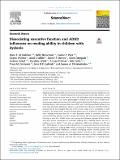Dissociating executive function and ADHD influences on reading ability in children with dyslexia
Author(s)
Al Dahhan, Noor Z; Halverson, Kelly; Peek, Carrie P; Wilmot, Dayna; D'Mello, Anila; Romeo, Rachel R; Meegoda, Olivia; Imhof, Andrea; Wade, Karolina; Sridhar, Anissa; Falke, Eric; Centanni, Tracy M; Gabrieli, John DE; Christodoulou, Joanna A; ... Show more Show less
DownloadPublished version (1.141Mb)
Publisher with Creative Commons License
Publisher with Creative Commons License
Creative Commons Attribution
Terms of use
Metadata
Show full item recordAbstract
Developmental dyslexia (DD) and attention-deficit/hyperactivity disorder (ADHD) are two of the most common neurodevelopmental disorders among school-age children. These disorders frequently co-occur, with up to 40-50% of children with one diagnosis meeting criteria for the other, and similar percentages of children with either DD or ADHD exhibiting impaired executive functions (EF). Although both ADHD and EF deficits are common in dyslexia, there is little evidence about how ADHD and EF deficits specifically influence the brain basis of reading difficulty in dyslexia, and whether the influences of ADHD and EF on dyslexia can be disentangled. The goal of the current study was to investigate, at both behavioral and brain levels, whether reading performance in individuals with dyslexia is more strongly associated with EF or with diagnostic status of comorbid ADHD. We examined reading abilities and EF in children (8-13 years old) with typical reading ability, DD only, or both DD + ADHD. Across both groups with dyslexia, impaired EF was associated with greater impairment on measures loading onto a reading fluency, but not a reading accuracy, factor. There were no significant differences between the DD and DD + ADHD groups on measures of reading fluency or reading accuracy. During functional magnetic resonance imaging (fMRI) while performing a rhyme-matching reading task requiring phonological awareness, typically developing readers showed greater left-hemisphere reading network activation than children with DD or DD + ADHD. Children with DD and DD + ADHD did not show differential activation, but DD children with unimpaired EF showed greater activation than those with impaired EF in reading-related areas. Thus, ADHD status alone had no measurable influence on reading performance or brain activation. Impaired EF in dyslexia, independent of ADHD status, was associated with greater deficits in reading fluency and greater reductions of activation in response to print in the typical left-hemisphere reading network.
Date issued
2022Department
Massachusetts Institute of Technology. Department of Brain and Cognitive SciencesJournal
Cortex
Publisher
Elsevier BV
Citation
Al Dahhan, Noor Z, Halverson, Kelly, Peek, Carrie P, Wilmot, Dayna, D'Mello, Anila et al. 2022. "Dissociating executive function and ADHD influences on reading ability in children with dyslexia." Cortex, 153.
Version: Final published version